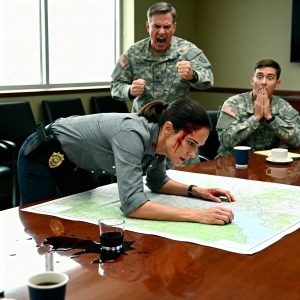Michael thought his diner was thriving until mysterious losses forced him to go incognito. What he discovered about his elderly dishwasher left him speechless.
The Empire That Lost Its Soul
In downtown Springfield’s bustling heart, where morning coffee mingles with exhaust fumes and hurried footsteps echo off weathered sidewalks, Carter’s Family Diner had been serving comfort and community for twenty-three years. The familiar red booths, gleaming chrome fixtures, and ever-present scent of sizzling breakfast created a time capsule that transported visitors to an era when dining meant connection, not convenience.
Michael Carter had transformed his American dream from a single failing roadside joint into seven thriving locations across three counties. Armed with nothing but determination and his last $12,000, he’d built an empire founded on simple principles: honest food, fair prices, and the kind of genuine hospitality that made strangers feel like neighbors.
But success had created an unexpected problem—distance from the very values that built his reputation.
When Numbers Don’t Add Up
From his corner office overlooking the city skyline, Michael stared at financial reports that defied logic. Customer reviews remained stellar, social media buzzed with recommendations, yet his flagship location was hemorrhaging money. Worse still, veteran employees were disappearing without explanation, offering only hollow excuses about “seeking new challenges” during their brief exit conversations.
The contradiction gnawed at him. His management team proposed conventional explanations—market saturation, supply chain issues, demographic shifts. None seemed adequate to explain why this particular location struggled while his six other restaurants flourished under identical circumstances.
Michael realized he’d become a prisoner of his own success. The mahogany furniture, panoramic windows, and quarterly reports had insulated him from the authentic human experiences that originally fueled his passion. Spreadsheets captured transactions, but they couldn’t measure the intangible elements that determined whether customers became loyal advocates or casual visitors.
After endless sleepless nights, Michael reached a radical conclusion: he needed to rediscover his own business from the ground up.
The Disguise
The plan sounded ridiculous even to him—a millionaire businessman masquerading as a regular customer in his own establishment. Yet the more he considered it, the more essential it became. Only by experiencing Carter’s through ordinary eyes could he diagnose what was rotting beneath the surface.
Constructing his alternate identity required meticulous attention to detail. Michael traded his designer suits for worn denim and flannel, swapped Italian leather for scuffed steel-toed boots, and crowned the transformation with a construction company baseball cap pulled strategically low. The psychological shift proved harder than the physical one—suppressing his analytical owner’s instincts while cultivating the relaxed demeanor of someone seeking nothing more complicated than a decent meal.
The Stranger in His Own Domain
That crisp October Thursday morning, Michael approached his flagship diner with butterfly-inducing nervousness. The familiar brass door handle felt alien beneath his deliberately roughened grip, while the welcoming chime that had greeted thousands of customers seemed to mock his deception.
Inside, the morning energy enveloped him—conversations layering over kitchen sounds, steam rising from coffee cups, servers weaving between packed tables. Yet something fundamental had shifted. The warmth felt manufactured rather than genuine, interactions seemed efficiently hollow, and the bustling energy carried a mechanical quality that replaced the passionate authenticity he remembered.
“Counter okay?” The question came from Megan, a young server whose name tag seemed newer than her attitude. She stood at the hostess station without making eye contact, her tone suggesting his arrival was an inconvenience rather than an opportunity.
“Perfect,” Michael replied, deliberately roughening his voice as he chose a stool offering clear sightlines to both dining area and kitchen while maintaining his anonymity.
The Discovery of Gold
Through the service window connecting dining room to kitchen, one figure immediately commanded Michael’s attention: an elderly man washing dishes with methodical precision that transcended mere job performance. Appearing to be in his mid-seventies, with silver hair and lined features that suggested equal measures of joy and hardship, he worked with steady determination that defied his obvious physical limitations.
This was Harry Lawson—though Michael didn’t yet know his name—embodying everything the restaurant owner had originally envisioned for his establishment. His presence radiated quiet dignity and work ethic that transformed mundane tasks into meaningful contributions. Unlike younger staff members who seemed focused on shift completion, Harry appeared completely present, treating each dish with careful attention that suggested pride in craftsmanship.
When Michael ordered—a club sandwich and coffee—he casually mentioned the elderly dishwasher. Megan’s response revealed volumes about the workplace culture that had infected his dream.
“Oh, that’s Harry,” she said with dismissive irritation. “Ancient history around here. Guy should’ve retired during the Clinton administration. He’s always slowing everyone down, can’t handle the heavy lifting anymore, and honestly just gets in our way when things get busy.”
Her casual cruelty stunned Michael. In his vision of Carter’s Diner, experienced employees represented institutional wisdom—valuable resources younger workers should appreciate and learn from. That Harry’s dedication was viewed as burden rather than blessing indicated cultural problems far deeper than financial discrepancies.
Witnessing True Character
Over the next hour, Michael observed Harry’s interactions with customers and colleagues, finding reality directly contradicted Megan’s harsh assessment. The elderly dishwasher moved with purposeful efficiency, experience enabling him to anticipate problems and implement solutions before situations escalated. When another server accidentally shattered a coffee pot, Harry materialized instantly with cleaning supplies, handling the mess without complaint or drama.
More remarkably, Harry functioned as the diner’s unofficial ambassador of compassion. Regular customers knew him by name, their faces lighting up during brief exchanges that elevated routine visits into meaningful connections. Children gravitated toward his gentle nature; he would pause to admire their artwork or listen to their excited stories with patient attention that made each child feel genuinely important.
The most revealing moment arrived as lunch rush subsided. A young mother with two fidgety children finished eating and approached the register, then froze with the unmistakable expression of someone confronting unexpected financial crisis. Color drained from her face as she searched her purse, realizing she lacked sufficient funds to cover the bill.
Megan, who had been gossiping with cashier Troy, addressed the situation with visible annoyance. The employees exchanged knowing glances and whispered comments clearly conveying their irritation. The mother’s embarrassment intensified as her children began sensing the tension.
Without hesitation, Harry dried his hands and approached the register. He reached into his own wallet—a worn leather billfold that had obviously seen decades of use—extracted several carefully folded bills, and quietly instructed Megan to apply them to the woman’s check. Tears filled the mother’s eyes as she gathered her children and whispered heartfelt thanks before quickly departing.
Troy’s reaction exposed the toxic culture poisoning Michael’s establishment. Rolling his eyes theatrically, he announced loudly enough for nearby customers to hear: “Third time this week with his charity act. Guy’s going to die penniless at this rate.”
Megan’s response proved even more callous: “Considering he’s living in his car, poverty’s not exactly a new concept for him. Probably figures he might as well blow his money on something that makes him feel like a hero.”
Their laughter struck Michael like physical violence. Here was an employee demonstrating precisely the compassion and community connection that should define Carter’s Diner, yet his actions earned mockery rather than respect.
Uncovering the Conspiracy
Through multiple undercover visits, Michael documented systematic dysfunction explaining both financial losses and employee exodus. Each observation revealed new layers of toxic behavior undermining his establishment’s foundation.
During his third visit, Michael learned fragments of Harry’s heartbreaking story through conversations with longtime customers. Harry’s beloved wife Sarah had battled cancer for four grueling years, and medical expenses had devoured their life savings, retirement funds, and eventually forced the sale of their family home. Rather than declaring bankruptcy, Harry chose to honor every debt, working multiple jobs to gradually eliminate accumulated medical bills.
A regular patron named Ron, who had frequented Carter’s for over a decade, shared details that brought tears to Michael’s eyes.
“Harry and Sarah used to come in every Sunday after church,” Ron explained with obvious affection. “Sarah was pure sunshine—remembered everyone’s names, asked about families, made you feel like the most important person in the world. When cancer struck, Harry liquidated everything to fund experimental treatments insurance wouldn’t cover. House, car, furniture, even Sarah’s grandmother’s jewelry. Never complained or asked for handouts, just quietly sacrificed whatever was necessary to give her every possible fighting chance.”
Ron’s voice cracked as he continued: “After Sarah passed, Harry couldn’t afford their apartment anymore. He’s been living in that beat-up sedan for nearly two years, parks it in the woods about a mile from here. Most folks don’t realize because he’s too proud to discuss personal business, but some regulars have figured it out. We’ve offered help—places to stay, money for rent—but he politely declines every time. Says he’s managing fine and doesn’t need anyone’s sympathy.”
The Real Crime
Michael’s investigation climax came when he witnessed the theft systematically draining his restaurant’s profits. He observed Megan and Troy executing a sophisticated fraud involving voided transactions and stolen cash, timing their crimes during busy periods when detection would be most difficult. Their method involved processing legitimate customer payments, immediately voiding the transactions, and pocketing cash while making sales appear as walkouts or order cancellations.
More despicably, they were orchestrating Harry’s downfall to cover their tracks. The conspirators had been fabricating cash shortages coinciding with Harry’s shifts, building false evidence that would allow them to report him for theft while claiming whistleblower bonuses. Harry’s generous acts—covering bills for struggling customers—provided perfect camouflage for their accusations.
The Revelation
The final confrontation required theatrical precision. Michael arranged for an actress to pose as a struggling single mother whose payment would be declined. Predictably, Megan and Troy treated her with cold indifference while Harry again stepped forward with his own money to resolve the situation, giving the thieves another fabricated shortage to exploit.
When Troy reported the supposed theft to shift manager Patricia, Michael knew his moment had arrived. Rising slowly from his counter stool, he removed his baseball cap and spoke in his natural voice for the first time in a week.
“You’re making a catastrophic mistake,” he announced, his words carrying authority developed through years of leadership. “I’m Michael Carter, and I own this restaurant. I’ve been conducting an undercover investigation, and I’ve documented everything happening here.”
The dining room transformation was instantaneous and complete. Conversations died mid-sentence as customers and staff turned to witness unfolding drama. Megan’s confident smirk dissolved into ashen uncertainty while Troy physically shrank. Patricia stood frozen in disbelief.
Michael calmly explained his possession of security footage documenting the theft, customer witness statements, and recorded conversations discussing their scheme. Law enforcement was already en route.
Justice and Redemption
As police officers arrived to arrest the conspirators, Michael approached Harry, who stood quietly near the kitchen entrance wearing an expression of confused dignity. Despite chaos swirling around him, the elderly man’s composure remained intact, his posture reflecting a lifetime of facing adversity with grace.
“Harry,” Michael said, approaching the man whose character had taught him more about leadership than any business school ever could, “I owe you an apology that’s inexcusably overdue. This establishment has failed you in unforgivable ways, but that changes immediately.”
What followed generated spontaneous applause from customers and remaining staff. Michael revealed he had already contacted collection agencies handling Harry’s medical debt and arranged complete forgiveness of all outstanding balances. Additionally, he had purchased and furnished a comfortable house within walking distance of the diner, which would serve as Harry’s permanent home with no financial obligations.
More significantly, Michael offered Harry immediate promotion to General Manager, utilizing his experience, wisdom, and natural leadership while providing comprehensive benefits, substantial salary increase, and authority to rebuild positive workplace culture. The position would eliminate physically demanding dishwashing while keeping him actively involved in daily operations.
The Transformation
In subsequent months, Carter’s Diner underwent comprehensive transformation extending far beyond personnel changes. Michael implemented policies designed to identify and reward employees embodying values Harry represented: compassion, integrity, work ethic, and authentic customer care. He established an emergency assistance program providing temporary financial support for employees facing unexpected hardships.
The community fund established in Harry’s honor became a model for corporate social responsibility, providing assistance to local families confronting medical emergencies, job losses, or other crises. The program operated with complete discretion, ensuring recipients could maintain dignity while receiving support.
Harry’s transition from dishwasher to General Manager proved one of the most successful personnel decisions in Carter’s history. His natural empathy, profound understanding of customer needs, and ability to mentor younger employees created workplace culture that attracted talented, caring individuals while repelling those whose values conflicted with the establishment’s renewed mission.
A New Legacy
Customer satisfaction soared to unprecedented levels as word spread about the diner’s transformation and Harry’s inspiring story. Business increased dramatically as people sought firsthand experience of the authentic hospitality that had become Carter’s signature. Staff turnover virtually disappeared as employees found themselves working in an environment that valued contributions and supported personal growth.
Every morning, Harry arrived at Carter’s Diner not as a forgotten dishwasher surviving on society’s margins, but as a respected leader whose life story reminded everyone that genuine success is measured through positive impact on others rather than accumulated wealth. His presence served as daily reminder that heroism often wears work clothes and that business success’s most important metrics are kindness, integrity, and authentic human connection.
The transformation became a case study in how businesses can rediscover core values and create positive change extending beyond profit margins. Michael learned that true leadership requires more than vision and financial expertise—it demands courage to confront uncomfortable truths and wisdom to recognize that companies’ greatest assets are often their most humble employees.
Harry’s story continues inspiring not only Carter’s staff and customers, but business leaders nationwide who have heard about his remarkable journey. His example proves that resilience, dignity, and compassion can triumph over devastating circumstances when supported by leaders who recognize and nurture these qualities.
Today, Carter’s Diner stands as more than a successful restaurant—it represents a vision of what businesses can become when they prioritize human values alongside financial performance. The establishment serves hundreds of customers daily, employs dozens in meaningful work, and contributes to community welfare in ways extending far beyond typical corporate responsibility.
And at its heart remains Harry Lawson, the quiet hero whose strength of character transformed not only his own circumstances, but an entire organization’s understanding of what success really means. His story continues unfolding, one act of kindness at a time, proving that sometimes the most powerful revolutions begin with the simple decision to treat every person with dignity and respect.





